When a pet develops an eye condition that requires surgical intervention, working with an experienced veterinary ophthalmologist is essential for proper treatment.
At The Eye Specialist for Animals, our veterinary ophthalmologists can perform pet eye surgery for dogs and cats. They can address conditions such as cataracts, glaucoma, and other complex eye diseases. In addition to helping companion animals, the team can provide eye surgery for horses, farm animals, and zoo animals, including elephants and giraffes. They have the evidence-based knowledge and training to deliver surgical approaches that can address the unique needs of each species.
By applying appropriate surgical techniques, our veterinary ophthalmologists aim to manage eye conditions, supporting vision and overall eye health in a range of animals.
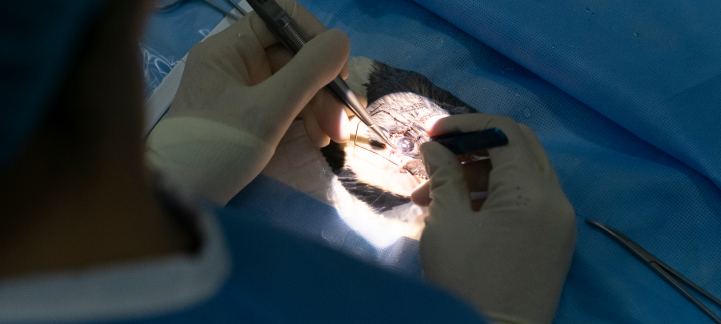
When medicine alone is not sufficient, The Eye Specialist for Animals offers eye surgery for canines, felines, farm animals, and zoo animals. Procedures available for pets and other animals include cataract surgery, glaucoma surgery, endothelial keratoplasty, and eyelid correction surgery, each tailored to the specific needs of the patient.
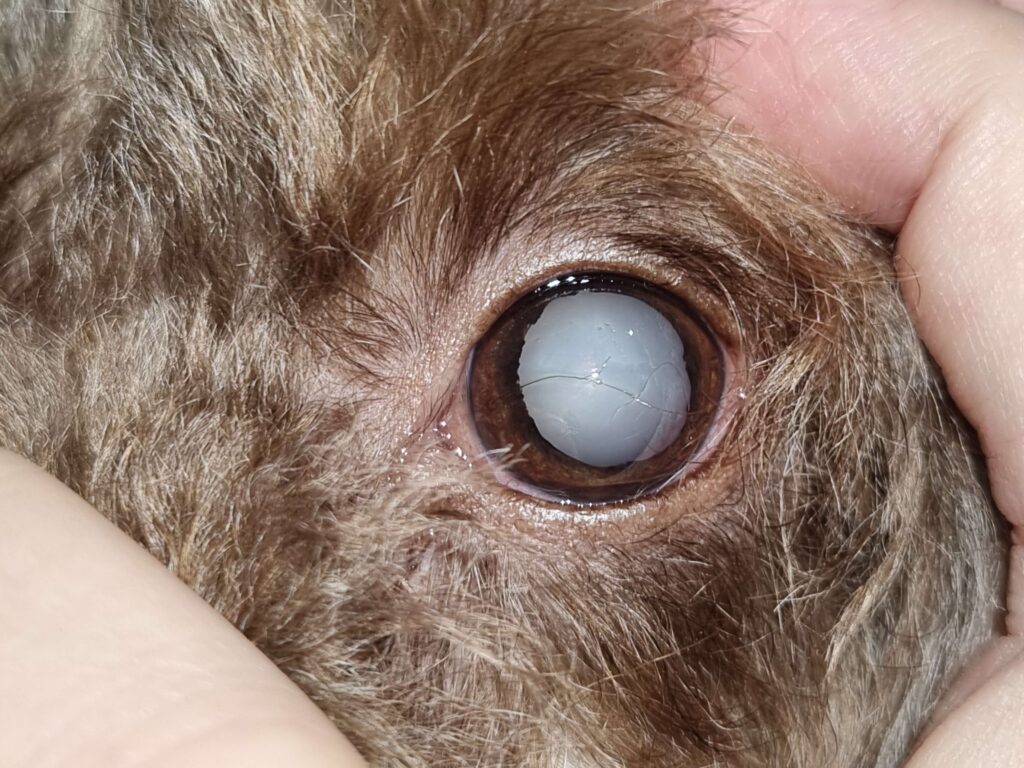
Cataracts are frequently diagnosed in certain dog and cat breeds, so when signs of cataracts appear, a thorough eye examination by a veterinary ophthalmologist is necessary. Proper pet eye tests are paramount to determine whether the condition is a cataract or nuclear sclerosis (normal ageing change in the lens). Furthermore, early detection gives you time to prepare if surgery is suitable for your pet.
The Eye Specialist for Animals has performed numerous surgeries on Singapore-bred dogs with complex cataracts that were often left too late. Cataracts can impair vision and, if left untreated, may lead to complications such as inflammation or glaucoma. Early detection allows for proper surgical planning and management, but even in advanced cases, pet cataract surgery could help restore vision.
Our board-certified veterinary ophthalmologist performs the procedure, which involves removing the clouded lens and replacing it with an artificial intraocular lens when appropriate. Careful post-operative management is essential to support healing and reduce the risk of complications.
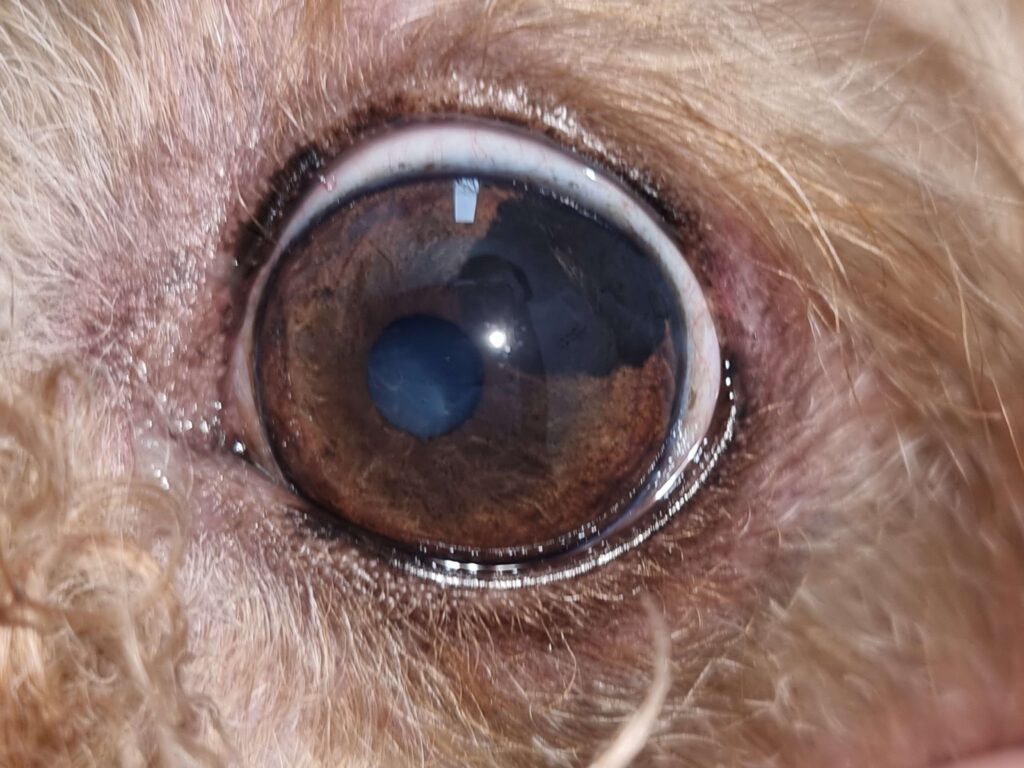
Corneal abrasions, complicated ulcers, corneal perforations are commonly encountered in dogs, cats and rabbits. Options to address this condition may involve medical therapy or, as a last resort, surgery. Some of the surgeries we perform include (but not exhaustive) keratectomy, conjunctival graft, corneo-conjunctival transposition, corneal laceration repair.
As an ocular centre for pets, we can perform collagen crosslinking for certain corneal conditions, such as keratomalacia. Dr Boo is trained and experienced in Descemet’s stripping endothelial keratoplasty, which is a type of corneal transplant.
Before the procedure, the pet’s iris is thoroughly examined, and options are discussed. Surgical options for the iris will then be discussed. These options include (but not exhaustive) iris biopsy, iridectomy (for resectable tumours), laser ablation, uveal cyst laser or aspiration.
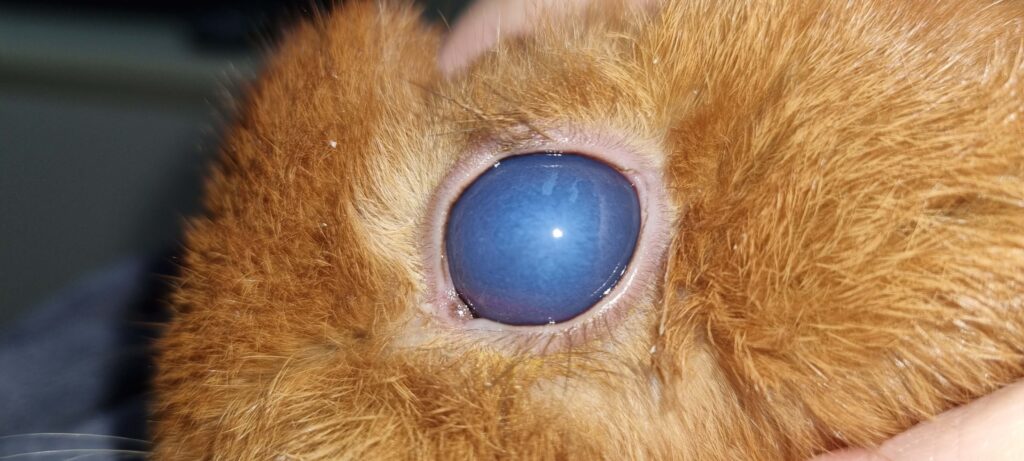
Glaucoma is a leading cause of blindness in dogs. Once glaucoma is detected by your regular veterinarian, your pet should be assessed by a veterinary ophthalmologist as soon as possible. This is because clinical signs of glaucoma can be elusive in the early stages. If a case presents late in the disease process, our options to preserve your pet’s vision and eye may be limited.
The glaucoma surgeries performed at The Eye Specialist for Animals include gonioimplants (also known as shunts) and transscleral cyclophotocoagulation. Veterinary ophthalmologists at the clinic routinely perform enucleation (eye removal), intrascleral prosthesis, and ciliary body ablation which can be a beneficial surgical option in the early stages.
Other surgical options for non-visual eyes include enucleation (eye removal), intrascleral prosthesis, and ciliary body ablation.
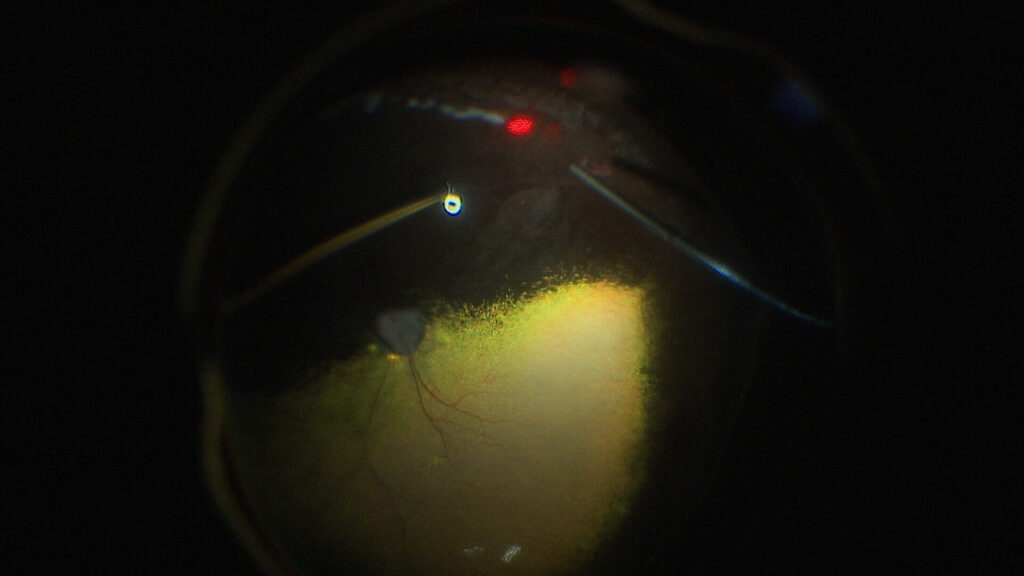
The retina is a sensitive neural tissue at the back of the eye that is not visible to the naked eye. If you notice that your pet has lost vision, it’s important to consult a veterinary ophthalmologist promptly.
The Eye Specialist for Animals provides retinal reattachment surgery, a multistage procedure that involves removing the vitreous gel from the eye. Since the opportunity to restore vision is limited, timely evaluation and intervention are critical after detection.
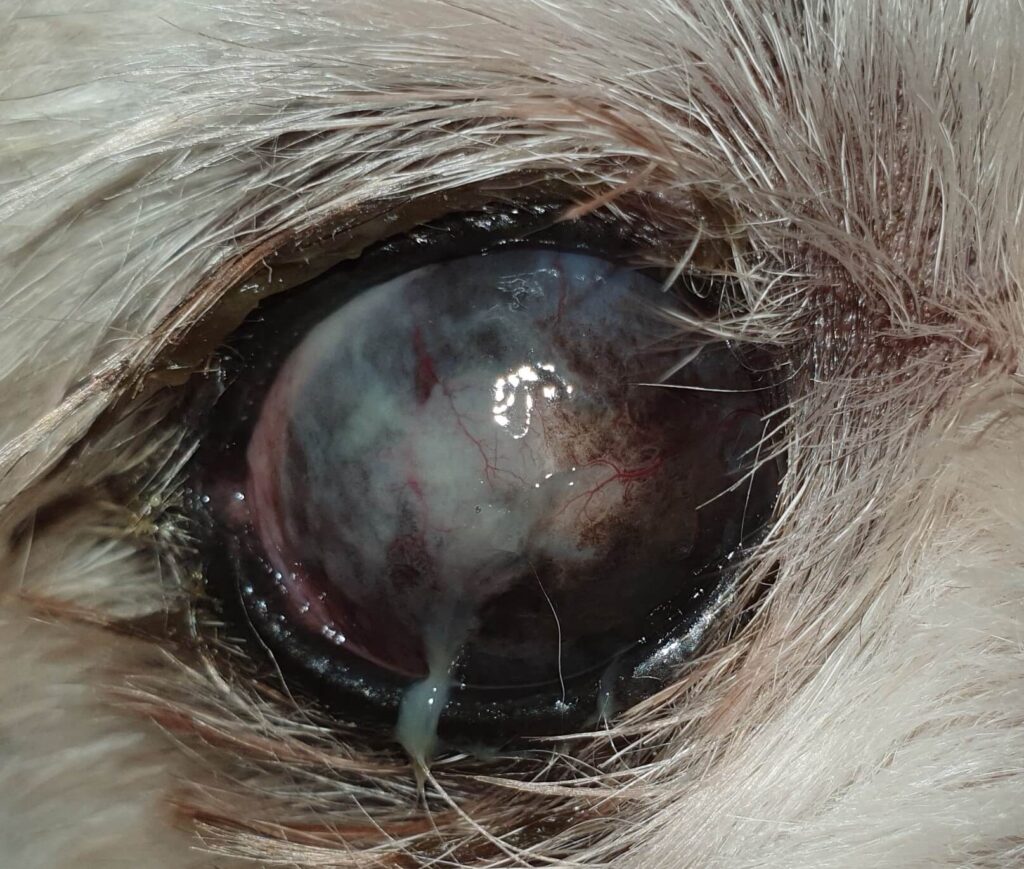
Tears are an essential part of a healthy eye. However, when different components of a tear film may be deficient, this could lead to an eye that looks dry. In turn, this increases the risk of corneal ulcers and pain in your pet. As such, early detection is ideal to avoid complications. Our veterinary ophthalmologist can help you formulate a treatment and management plan. And if medical therapeutic options are exhausted, they can perform parotid duct transposition surgery on your pet.
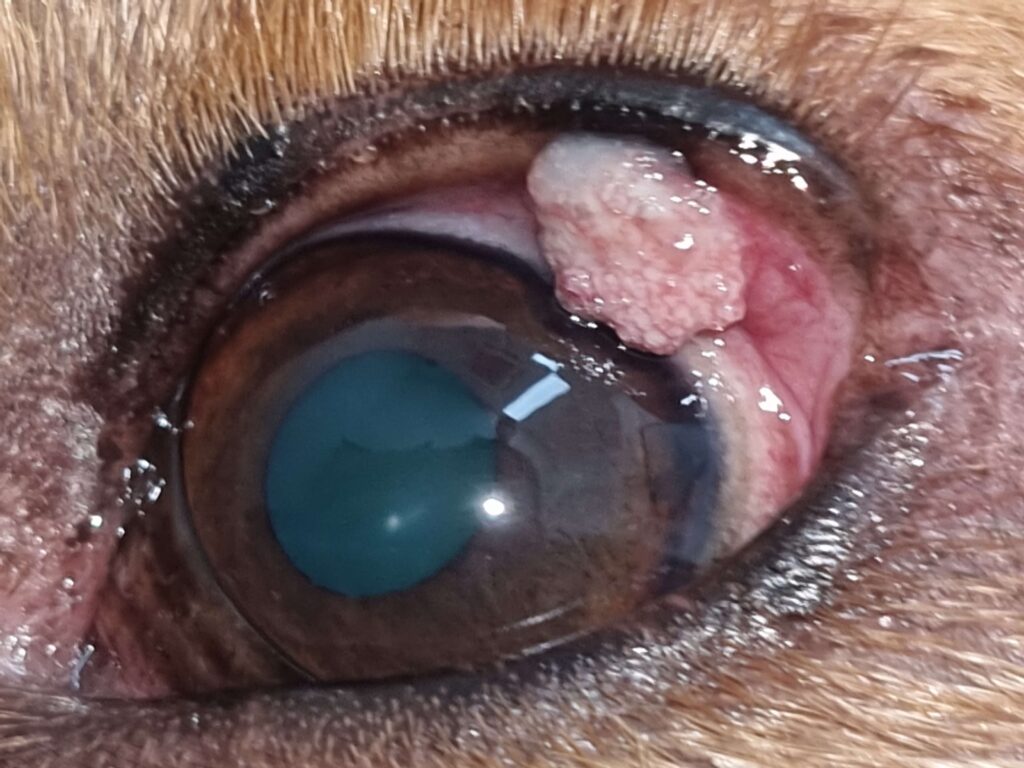
Enucleation, exenteration of tumours in the orbit and orbitotomies are surgical options for various different ocular conditions. Eyelid correction and reconstruction surgeries are frequently performed by board-certified veterinary ophthalmologists. They include (not exhaustive):
Eyelid mass removals can be performed to help potentially restore normal lid function. They can also perform surgery for distichiasis and ectopic cilia resection.
It’s important to note that third eyelid surgeries may include nictitans gland prolapse repair or scrolled cartilage correction.
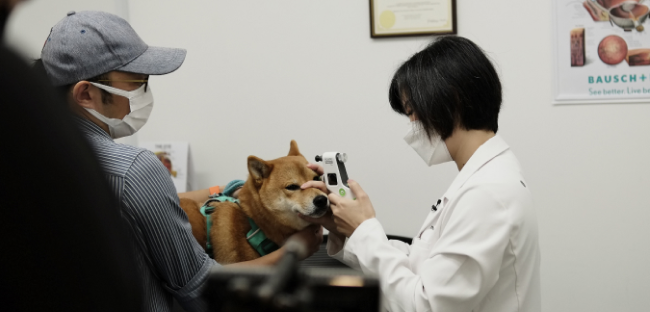
The Eye Specialist for Animals is equipped to perform ophthalmic testing. These include tests such as:
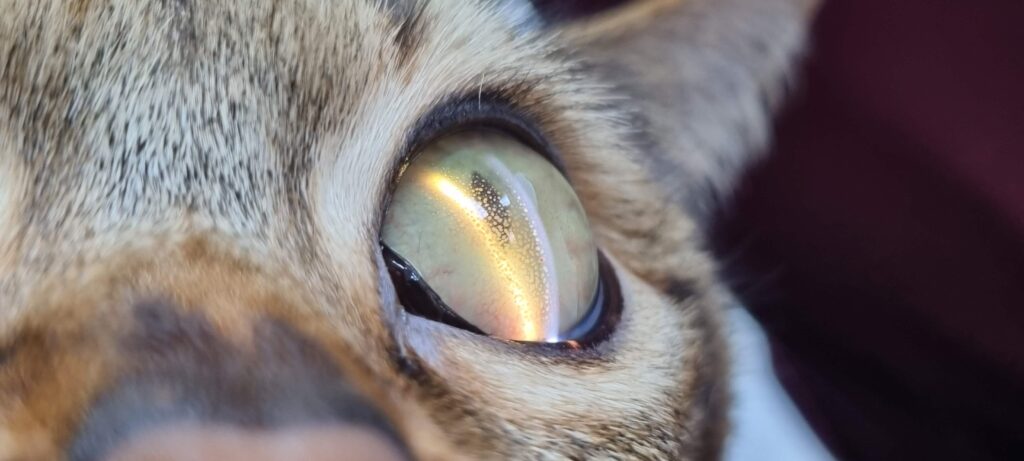
There are many possible causes of uveitis, and a thorough ocular examination by a veterinary ophthalmologist is necessary to identify the cause and address this condition. Carefully sampling of ocular fluid or tissues may be required in rare cases. Occasionally, these cases may require multidisciplinary speciality involvement.
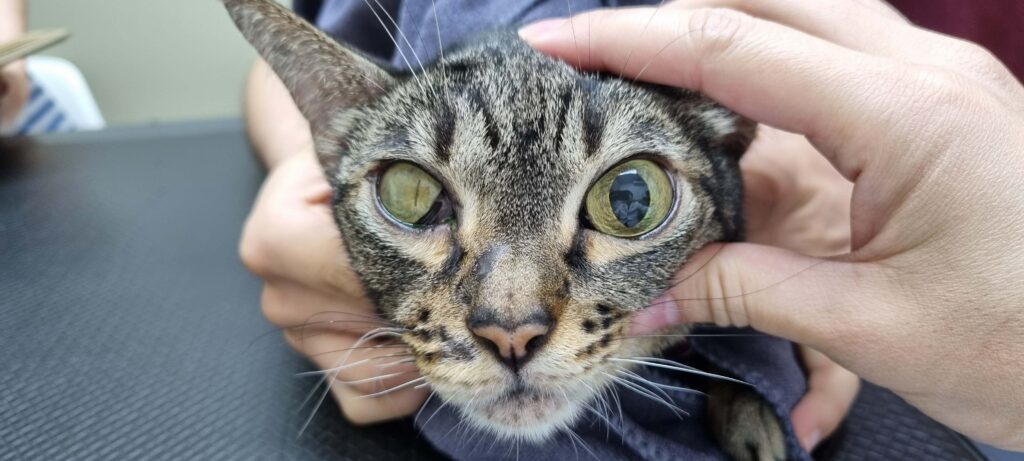
Our specialist can detect and manage diseases affecting the brain and nerves that are closely related to the eyes. Often, these cases may require multidisciplinary speciality involvement.

During ocular diagnostic tests for pets, a slit lamp biomicroscope is used to evaluate the front portion of the eye on a microscopic level. This instrument allows for the optical sectioning of the eye. The back portion of the eye is evaluated using indirect ophthalmoscopy and a series of condensing lenses.
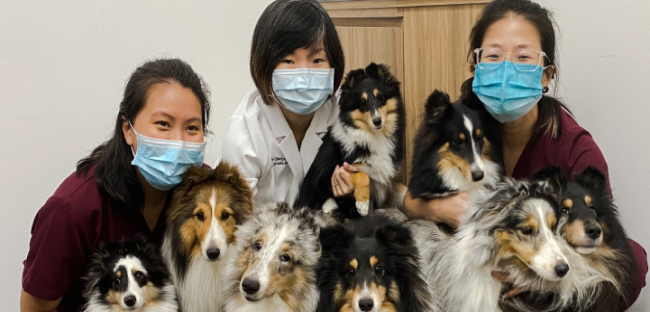
The Eye Specialist for Animals is proud to be able to provide OFA Eye Certification Registry examinations to breeders of dogs. These examinations find potential heritable eye diseases in dogs before they are passed on to future generations, helping to limit the amount of genetic eye disease in dogs and produce healthier dogs.
The Eye Specialist for Animals is proud to be able to provide OFA Eye Certification Registry examinations to breeders of dogs. These examinations find potential heritable eye diseases in dogs before they are passed on to future generations, helping to limit the amount of genetic eye disease in dogs and produce healthier dogs.
Please see the OFA website for additional information.
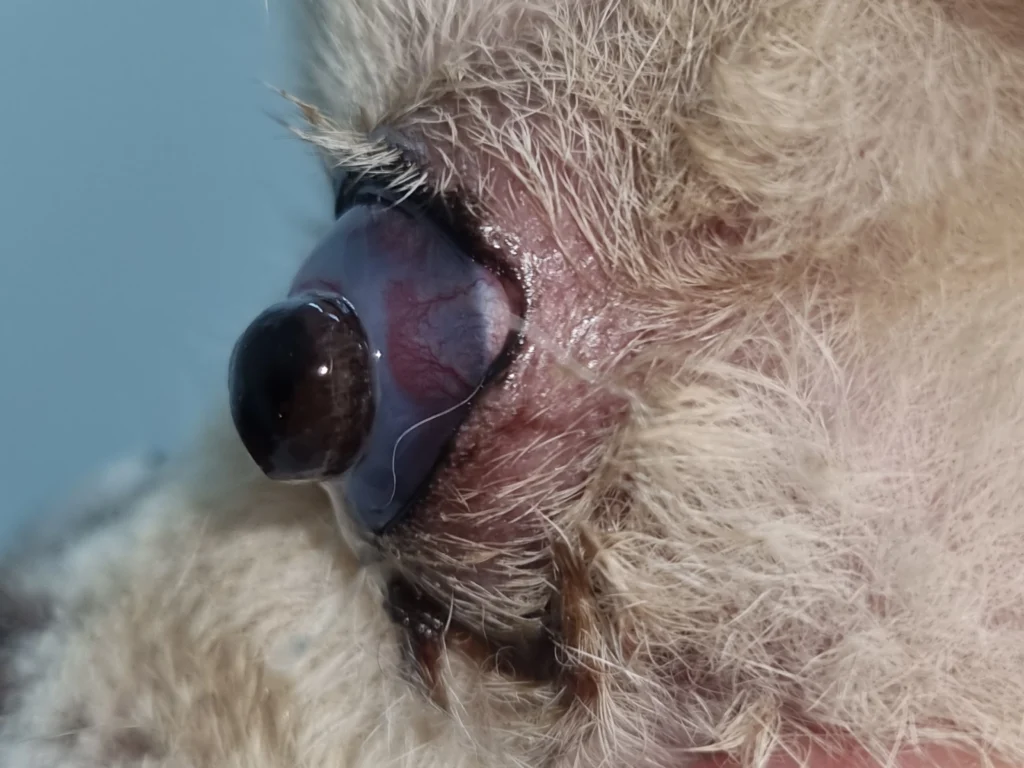
Any injury where the head was involved with blunt force trauma or any injury that is life-threatening should be evaluated promptly by your primary veterinarian or the nearest 24-hour emergency hospital.
The Eye Specialist for Animals is available for emergency referral cases during business hours and after hours on a case-by-case basis.
The Eye Specialist for Animals can address some ocular emergencies, such as a corneal or lens laceration, ruptured eye, lens luxation, glaucoma, or proptosis (eye displaced from the socket). Pet eye surgery can be performed for some of these cases.
We are open from 8:00 a.m.- 6:00 p.m. Monday through Thursday. If you feel your pet is having an ocular emergency, call 6241 2011 or have your primary care veterinarian call our clinic during business hours to discuss emergency referrals.
For new clients:
You must be referred by a veterinarian, either your primary care veterinarian or an emergency veterinarian. The veterinarian should call the number 6241 2011 and leave a message with the receptionist or email us at [email protected]. The message should include:
A message will be sent to the on-call staff that will contact your veterinarian to determine the best course of action for your pet. Our on-call staff will then contact you to discuss arrangements for an after-hours examination and fees associated with the emergency visit.
Your veterinarian and our veterinarian may determine emergency examination can wait until business hours and instead discuss the best medical management for your pet until referral.
A specialist veterinary ophthalmologist is a Diplomate of the American or European College of Veterinary Ophthalmologists or Fellow of the Royal Australian New Zealand College of Veterinary Scientists (Ophthalmology). Specialist status has been introduced to protect owners and their pets, ensuring they are genuinely dealing with trained and knowledgeable professionals in a specific field of expertise. An officially recognised Veterinary Specialist is an individual who has undergone training in an approved facility provided by a fully qualified expert in their field.
It takes in the order of 10,000 – 12,000 hours for a vet to become a Specialist vet. A vet wishing to become a Specialist will normally do one or two 12-month internships at a Specialist centre. Then, they apply for a 3-year Residency where he/she train directly under other Specialists spending 100% of their time on their area of specialism. Therefore, in total, the process generally takes about 5 years. This also includes publishing clinical research papers before the vet is ready to sit the Specialist exams, which can sometimes have a pass rate of only 30%.
Candidates who pass the exams are known as Diplomates and win the hard-earned right to be called a Specialist.
Terms such as “Consultant”, “Ophthalmologist” or other such terms are confusing for the general public as, in the human medical field, they imply specialist status. It is important to understand that this is not the case in the veterinary field. Only a veterinary surgeon who is a Recognised Specialist is allowed to call themselves a “Specialist”. Always ask to ensure you are seeing a fully qualified Specialist. You can check the Singapore Veterinary Association to clarify whether the person you are seeing is a recognised specialist in veterinary ophthalmology.
The veterinary profession has several levels of postgraduate study available for people interested in ophthalmology. The Certificate in Veterinary Ophthalmology is awarded to general practitioners who have an interest in a subject, but this is not a specialist qualification. This is also not a recognised formal ophthalmology training programme in an approved facility.
The first step is a consultation with a veterinary ophthalmologist, who will conduct a thorough eye examination to assess the condition and determine if surgery is necessary for your pet. Diagnostic tests, such as ocular ultrasound or electroretinography, may be required to evaluate the overall eye health.
If eye surgery is recommended, the specialist will discuss the procedure, risks, expected outcomes, and post-operative care. Pre-surgical blood tests may also be conducted to ensure your pet is fit for anaesthesia.
Once all necessary evaluations are complete, a surgery date will be scheduled, and detailed pre-operative instructions will be provided.
On the day of eye surgery, your pet will be admitted in the morning after an overnight fast unless instructed otherwise.
The veterinary team will conduct a final examination and administer anaesthesia under careful monitoring. The surgical procedure will then be performed in a sterile environment, and once completed, your pet will be moved to recovery, where vital signs and comfort are closely monitored.
You will receive post-operative care instructions, including medication guidelines and activity restrictions. The clinic will inform you when your pet is ready to be discharged, typically later the same day.
Most pets are discharged on the same day of eye surgery after a period of post-anaesthetic monitoring.
Before discharge, you will receive detailed home-care instructions, including medication schedules, activity restrictions, and follow-up appointment details. It is important to keep your pet calm and closely follow post-operative care guidelines to ensure proper healing and reduce the risk of complications.
We perform overnight intensive care for any patients as well. If overnight care is needed, the owner will make separate arrangements on their end. This situation has occurred in the past where the owners are travelling or not capable of administering the drugs or eye drops.
Post-surgical follow-up appointments are typically scheduled with the ophthalmologist to monitor healing and assess the outcome of the pet eye surgery. However, in some cases, routine check-ups can be coordinated with your referring veterinarian.
Your specialist will provide a report and post-operative care instructions to your primary veterinarian, ensuring continuity of care.
If complications arise or further specialised treatment is needed, additional visits to the ophthalmologist may be required. It is essential to follow the recommended follow-up schedule to detect any issues early and support your pet’s recovery.
Your primary care veterinarian can refer you to see our ophthalmologist. You or your veterinarian can call reception at +65 6241 2011 or email us at [email protected] and then make an appointment with us and send us your pet’s history.
Early detection of canine and feline eye problems can be critical to address them in time before permanent damage or blindness sets in.
Some unusual signs may be:
Your primary care veterinarian should be your first port of call to identify if it is an emergency. In general, there is only a small window of opportunity for us to correct a condition in the eye with minimal complications and high success rates. Therefore, most eye conditions should not wait.
No. Dogs are not humans. The cause of cataracts in dogs is not as commonly associated with ageing as in the case of humans. If your dog has a cataract, please see an ophthalmologist to give you correct and the most current advice. Cataracts are not a benign condition, they SHOULD NOT be neglected.
We are passionate about your pet’s vision and quality of life.
With our surgical equipment and diagnostic techniques, we aim to deliver advanced eye care for your pet with compassion and warmth.
Schedule A Consultation
Using state-of-the-art surgical equipment and diagnostic techniques, we aim to deliver advanced eye care for your pet with compassion and warmth.